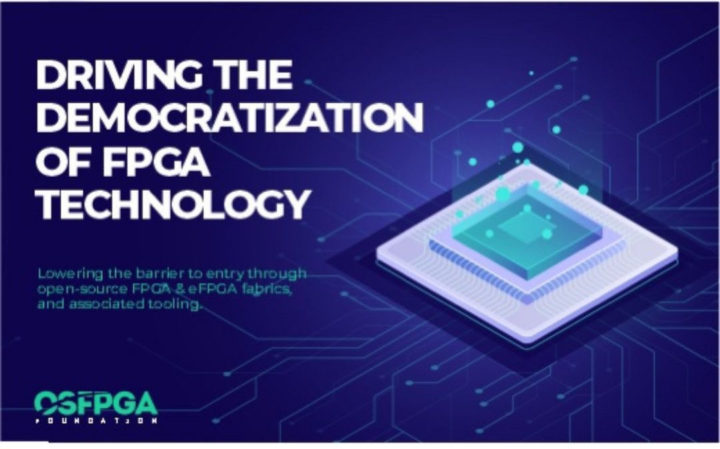There are been some initiatives to work on open-source tools for FPGA. Major FPGA vendors have made limited efforts, with for example Xilinx recently releasing the source code for HLS FPGA tool’s front-end, but most of the work is done by the community with projects like Symbiflow dubbed the GCC of FPGAs, or Project IceStorm for Lattice Semi FPGAs.
Industry veterans and academics have decided to launch the Open-Source FPGA (OSFPGA) Foundation that aims to bring together companies, universities, and individuals to advance open-source FPGA capabilities, establish cooperation channels, promote outreach and education, and coordinate joint efforts around an open-source FPGA ecosystem.
The OSFPGA Foundation goals go beyond just providing open-source tools, as the vision statement also mentions “open-source FPGA & eFPGA fabrics”, the Github page also includes IP blocks with the FuseSoC package manager for IP cores, the Skywater Open-source FPGAs, and LiteDRAM lightweight, configurable DRAM core.
Current board members include:
- Dr. Naveed Sherwani, chairman of Silicon Federation. He previously served as chairman, president, and CEO of SiFive, currently serves as chairman for StarFive and LeapFive among others, and serves as chair working on RISC-V strategic alliances at RISC-V international.
- Pierre-Emmanuel Gaillardon, Associate Professor and the Associate Chair for Academics and Strategic Initiatives in the Electrical and Computer Engineering (ECE) department and an adjunct Associate Professor in the School of Computing at The University of Utah, Salt Lake City
- Mr. Serge Leef, program manager at DARPA since August 2018 in the Microsystems Technology Office (MTO). His research interests include computer architecture, simulation, synthesis, semiconductor intellectual property (IP), cyber-physical modeling, distributed systems, secure design flows, and supply chain management.
- Xifan Tang, a research assistant professor with the University of Utah. He is also the lead developer of the OpenFPGA project.
- Giovanni De Micheli, a research scientist in electronics and computer science, professor and director of the Integrated Systems Laboratory at EPFL Lausanne, Switzerland. He is credited for the invention of the Network on Chip design automation paradigm and for the creation of algorithms and design tools for Electronic Design Automation (EDA).
- Brian Faith, president and CEO of QuickLogic since June 2016. He is active in the CHIPS Alliance and OpenHW Group.
That means there’s at least one person working for an FPGA vendor currently involved in the initiative. There’s currently little information on the website as they just launched a couple of days ago, and most of the resources are on the Github page. Over time the OSFPGA foundation will gather more resources, promote the tools via online and live events, support the development of the open-source tools and IP blocks, as well as help maintain documentation and tutorials. They also plan on helping with the testing and validation of FPGA architectures in hardware.

Jean-Luc started CNX Software in 2010 as a part-time endeavor, before quitting his job as a software engineering manager, and starting to write daily news, and reviews full time later in 2011.
Support CNX Software! Donate via cryptocurrencies, become a Patron on Patreon, or purchase goods on Amazon or Aliexpress





